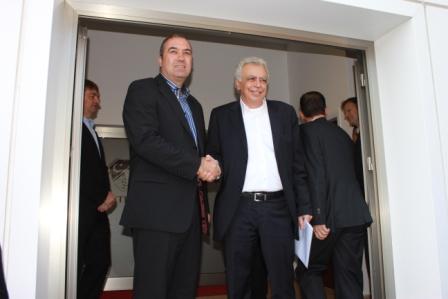By Andrew Warshaw, Chief Correpondent, in Nicosia
Janaury 17 – Football re-unification on the bitterly divided island of Cyprus took a pivotal step forward today when the leaders of the respective Greek and Turkish Cypriot federations announced they were closer than ever to burying their differences after decades of separation and mistrust.
In what was described by both sides as a crucial breakthrough that could pave the way for ultimate integration, Cyprus Football Association president Costakis Koutsokoumnis (pictured right) met with his opposite number, Cyprus Turkish Football Association leader Hasan Sertoglu (pictured left) to set out a roadmap for a deal that will have ramifications far beyond fans on both sides of the island.
The meeting, the first ever at the headquarters of the unofficial CTFA close to the United Nations-controlled buffer zone, was attended by observers of both FIFA and UEFA and follows a reciprocal visit to the CFA – FIFA members since 1948 – by Sertoglu last month.
In a hugely symbolic gesture, Koutsokoumnis was collected at the checkpoint between the two sides and driven the 200 metres to the offices of the CTFA where the respective federation presidents shook hands warmly before settling into an hour of talks that ended with the historic announcement that they would visit FIFA headquarters in March to try and finalise a draft agreement.
“We were close when we met at the CFA last time and now I see light at the end of the tunnel,” said Koutsokoumnis. “It is not a torchlight, it’s a huge spotlight.”
“The re-unification of football on the island has been a problem in existence for the last 58 years. Hopefully it will take far less time to re-unify football in the weeks to come. Now that FIFA and UEFA are with us, the next step is to join them, probably in Zurich, to try and unify the differences that might still exist.”
Greek and Turkish Cypriot clubs played together in an all-Island league until 1955 when they were forced to go their separate ways. The island has been divided politically since the 1974 Turkish military intervention and although United Nations efforts at re-unification are still ongoing, they have so far failed to yield results.
The Turkish Cypriots clearly have much to gain from re-unification. The entire €2.6m annual budget of Sertoglu’s federation dwarfs the salaries of scores of top earners in the major European leagues and while the Turkish Cypriots have a long history of football – with 48 clubs in three active divisions – standards, attendances and facilities are all suffering badly, with most of the top players needing second jobs as a result of being plunged into the international wilderness.
Sertoglu, unused to being in the spotlight outside his own community, looked slightly uneasy as he stretched out a hand of friendship to Koutsokoumnis at the CTFA’s modest, unprepossessing building. “During this meeting we came much closer (to an agreement)”, said Sertoglu, who personally initiated contact with the Greek side via intermediaries. “I had some suspicions about how the talks might go but I believe more than ever that we will be able to solve these issues. I felt their intentions were strong.”
Sertoglu requested only two questions from the floor but the respective presidents ended up being interrogated for clarification and details of what was in the draft agreement – and what the Greek Cypriots, whose football is fully professionally in the top division, stood to gain.
“Unification of football on the island can help both authorities here,” insisted Koutsokoumnis who gave the broadest hint yet that an all-Cypriot national team could be on the cards.
“Maybe Turkish Cypriot football cannot contribute in the administration or the level of football on the Greek side but in the long run we are looking for mutual benefits,” he said. “The development of Turkish Cypriot football has taken place with the constraints that exist right now. In future, if this is different, they might contribute to the national team.”
Koutsokoumnis said fine-tuning the draft agreement was all about the right “packaging” to make sure FIFA and UEFA statutes are correctly respected and, crucially, that politicians on the island don’t block the deal – which is what happened in 2008 when a previous initiative was attempted by FIFA. “It means we agree on most points of principle but we need to package them in a way that will be accepted by others.”
Koutsokoumnis said the draft agreement had been worked out “over the last few days” and that the document will be discussed at the March meeting. Declining to divulge details, such as who would govern the game on the Turkish side, he said: “There are certain sentiments on both sides and we wouldn’t like to excite these even more before we strike a final agreement. If that happens in March, we’ll be very close to the end of the road.”
Contact the writer of this story at zib.l1745519668labto1745519668ofdlr1745519668owedi1745519668sni@w1745519668ahsra1745519668w.wer1745519668dna1745519668

